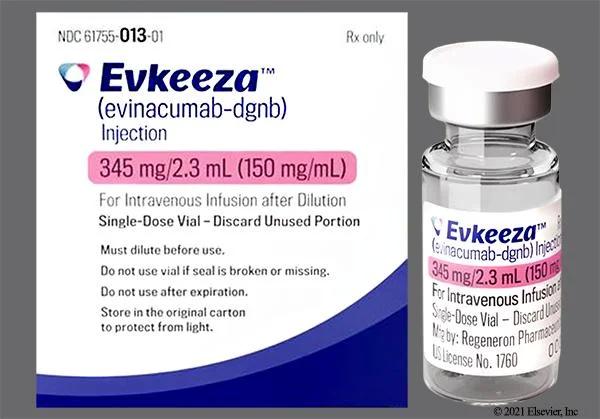Evinacumab Side Effects
Medically reviewed by Drugs.com. Last updated on Feb 2, 2025.
Applies to evinacumab: intravenous solution.
Precautions
It is very important that your doctor check your progress at regular visits to see if the medicine is working properly to lower your cholesterol level and to decide if you should continue to use it. Blood tests may be needed to check for unwanted effects.
Receiving this medicine while you are pregnant can harm your unborn baby. If you are a woman who can get pregnant, your doctor may do tests to make sure you are not pregnant before starting treatment. Use an effective form of birth control to keep from getting pregnant during treatment and for at least 5 months after your last dose. If you think you have become pregnant while receiving the medicine, tell your doctor right away.
This medicine may cause serious allergic reactions, including anaphylaxis, which can be life-threatening and require immediate medical attention. Check with your doctor right away if you or your child have chest tightness, cough, difficulty swallowing, dizziness, fast heartbeat, hives, itching, puffiness or swelling of the eyelids or around the eyes, face, lips, or tongue, skin rash, trouble breathing, or unusual tiredness or weakness.
Common side effects of evinacumab
Some side effects of evinacumab may occur that usually do not need medical attention. These side effects may go away during treatment as your body adjusts to the medicine. Also, your health care professional may be able to tell you about ways to prevent or reduce some of these side effects.
Check with your health care professional if any of the following side effects continue or are bothersome or if you have any questions about them:
More common side effects
Less common side effects
- body aches or pain
- constipation
- ear congestion
- lack or loss of strength
- loss of voice
- pain in the arms or legs
- sneezing
- stomach pain
Serious side effects of evinacumab
Along with its needed effects, evinacumab may cause some unwanted effects. Although not all of these side effects may occur, if they do occur they may need medical attention.
Check with your doctor or nurse immediately if any of the following side effects occur while taking evinacumab:
Less common side effects
- chest tightness
- cough
- difficulty swallowing
- dizziness
- fast heartbeat
- hives, itching, skin rash
- puffiness or swelling of the eyelids or around the eyes, face, lips, or tongue
- trouble breathing
- unusual tiredness or weakness
See also:
For healthcare professionals
Applies to evinacumab: intravenous solution.
General adverse events
The more frequently reported adverse reactions have included nasopharyngitis, influenza-like illness, dizziness, rhinorrhea, and nausea.[Ref]
Hypersensitivity
- Uncommon (0.1% to 1%): Anaphylaxis
Anaphylaxis was reported in 1 patient receiving this drug during clinical trials and led to discontinuation of treatment.
Respiratory
- Very common (10% or more): Nasopharyngitis (16%)
- Common (1% to 10%): Rhinorrhea
- Frequency not reported: Upper respiratory tract infection, nasal congestion
Compared to placebo, upper respiratory tract infection and nasal congestion were reported at a higher incidence; incidence was less than 3% of patients.
Immunologic
- Frequency not reported: Influenza-like illness
Compared to placebo, influenza-like illness was reported at a higher incidence; incidence was less than 3% of patients.
Cardiovascular
- Frequency not reported: Diastolic blood pressure decreased, increased heart rate
During clinical trials, transient decreases in diastolic blood pressure and increases in heart rate occurred but did not require intervention and resolved post infusion.
Nervous system
- Common (1% to 10%): Dizziness
Gastrointestinal
- Common (1% to 10%): Nausea
- Frequency not reported: Constipation, abdominal pain
Compared to placebo, constipation and abdominal pain were reported at a higher incidence; incidence was less than 3% of patients.
Musculoskeletal
- Common (1% to 10%): Extremity pain
Other
- Common (1% to 10%): Asthenia
Local
- Common (1% to 10%): Infusion site reactions
Infusion site reactions including infusion site pruritus, pyrexia, muscular weakness, nausea, and nasal congestion were reported in 7% of patients (n=6) receiving this drug compared to 4% (n=2) of placebo patients.
References
1. (2021) "Product Information. Evkeeza (evinacumab)." Regeneron Pharmaceuticals Inc
Frequently asked questions
More about evinacumab
- Check interactions
- Compare alternatives
- Dosage information
- During pregnancy
- Drug class: miscellaneous antihyperlipidemic agents
- Breastfeeding
- En español
Patient resources
Other brands
Professional resources
Other brands
Related treatment guides
Further information
Evinacumab side effects can vary depending on the individual. Always consult your healthcare provider to ensure the information displayed on this page applies to your personal circumstances.
Note: Medication side effects may be underreported. If you are experiencing side effects that are not listed, submit a report to the FDA by following this guide.

